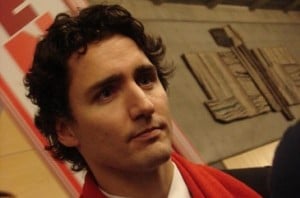Justin: serious about edumacation
Trudeau’s plan to enroll more Canadians misses the point
ycanada_news/Flickr
Share

To read more by Colby Cosh, visit Macleans.ca
The Liberal Party of Canada held its third leadership debate over the weekend; you probably heard about how it led to an argument about the terrible things Martha said to Justin and what Marc said about what Martha said to Justin and whether or not there is actually anything in what Martha said to Justin… well, the news-cycle hivemind cannot help making things personal.
Something more interesting actually happened immediately before the debate, when Justin Trudeau published an op-ed on federal education policy—a self-evident attempt to deflect Marc Garneau’s criticisms of him for being a policy lightweight with no specific program. But I’m afraid reading the piece had me saying “If only!”
A Liberal Party led by me would make it the highest national economic priority to raise our post-secondary education rate…The Canadian promise, that if you get educated and work hard, you can guarantee a better life for yourself and for your kids, is being seriously questioned. Canadians are rightly concerned that their leaders have lost focus on the policy that is at the heart of this promise: access to affordable, high-quality education. So what should the federal role look like? It should be principled, specific and targeted at the overall goal of raising our participation rate from just over 50 per cent to 70 per cent.
It is impressive how slyly this op-ed transforms an argument for an educated citizenry into an argument for a massive expansion of specific institutions. Were the Justin Trudeaus of 1900, one wonders, calling for more Canadians to be trained as carriagemakers and blacksmiths? Universities, community colleges, and even trade schools are facing an unprecedented threat of electronic disintermediation; as textbooks, scholarly literature, and datasets are liberated by devoted anarchists like the late Aaron Swartz, vipers within the bosoms of the big old-fashioned schools are plotting to sabotage them with schemes for cheap, distributed online education.
Meanwhile, if your life is anything like mine, everywhere you look you see people choosing to pursue self-directed education and private-sector credentials, few of which are supplied by the academy as such. Got any friends boning up for professional accounting exams? Taking Microsoft programming courses? Acquiring CSS or CAD in their spare time? Learning art history or statistics from podcasts? Debating the art of drum-kit miking in an online forum?
I hardly know anybody who isn’t involved in what would have been called “continuing education” 20 years ago, when we still needed a term for it. Not all of these people wriggled past Grade 12 within the System, yet many have already built second careers, profitable avocations, or side businesses on human capital accumulated outside it.
If an educated, economically flexible populace is what we want, it might well be more sensible to reduce the secondary-education “participation rate” to 30% than to raise it to 70%. This is not to knock the spiritual and social benefits of formal education. (Mine got me a soft job making fun of people with political ambitions!) But Mr. Trudeau’s argument is explicitly economic, a matter of return on investment. By that criterion, the case for herding more marginal, otherwise uninterested students into school is questionable. We already have a lot of people, perhaps as many as any country, pursuing non-“STEM” (science, technology, engineering, and math) credentials and not getting much cash back. (Research on social rates of return from education indicates that most undergraduate degrees, STEM or not, are good bargains. But the benefit to additional students enticed by new forms of subsidy isn’t likely to be as great. The law of diminishing returns applies. It always applies.)
A policy to prepare young Canadians for a chaotic future might start with equipping primary schools better to facilitate the “lifelong learning” that has leapt, in a heartbeat, from windbag educator ideal to practical reality of the human condition. That is not, I hasten to add, really Ottawa’s business. Which is probably just as well, judging by troubled, expensive American national efforts to soup up the literacy and quantitative skills of their masses. It’s disturbing to see the near-certain next leader of the Liberal party behaving and thinking as though policymaking were a matter of simple Augustan fiat. We want people to be better-educated? Why, give them more education! Honestly, is this stuff so hard?
Justin’s education op-ed may not actually be unrelated to those awkward questions about his personal background and his preparedness for the leadership of a great political party. Trudeau is a man of leisure who had time and means to acquire two undergraduate degrees, along with bits and bobs of a couple others. It must come to about a decade of his life if you add it all up. Of course he respects formal education; he has guzzled it down as if he had heard they weren’t making any more of it.
But where is the awareness that some kinds of education may yield poor returns, or that 19th-century institutions may not be an ideal venue for teaching 21st-century citizens? Practically anybody—one is tempted to say “any random middle-class person”—could think through and itemize the problems with a “50% must be made 70%” approach. Trudeau didn’t.